How Much Does an HACCP Plan Cost? – [Updated for 2023]
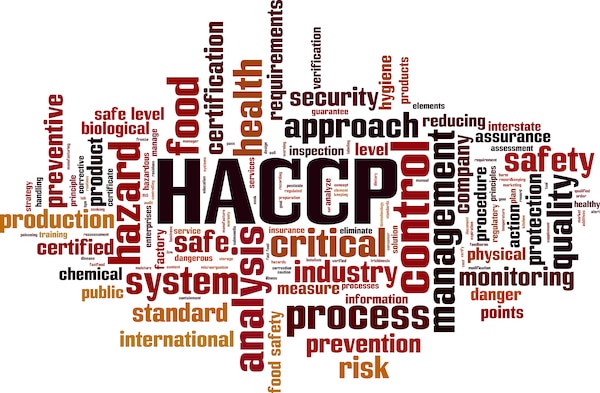
What does HACCP certification cost? It sounds like a simple question, but the answer is more complex than you may think. In a nutshell, expenses typically vary depending on a few factors. These include:
- Which organization or entity is undertaking the HACCP audit?
- The kind of enterprise you own.
- What will the rectification cost be if an auditor finds your establishment does not comply with one or more of the industry’s regulations?
Let’s explore HACCP certification, its regulators, what audit processes entail, and finally, answer the question: How Much Does a HACCP Plan Cost? Of course, we also have a HACCP training package to put you on the right track.
What is HACCP Certification?
HACCP stands for Hazard Analysis Critical Control Points. A HACCP plan is all about food safety and the regulation thereof. HACCP certification ensures that entities that supply food to the public are providing safe and healthy food for consumption.
The HACCP certification system takes a holistic approach. An auditor will assess your HACCP plan. It requires food to have been safely grown, harvested and purveyed to the public. The process aims to minimize the risks of food-borne illnesses.
Further, it considers potential physical, chemical, and biological hazards to consumers. This system has been developed to identify and control food contamination issues before they become real health hazards.
This certification means a trained internal or external auditor will assess an establishment’s food safety management systems. An auditor will certify they comply with industry HACCP plan standards or recognize if they are not.
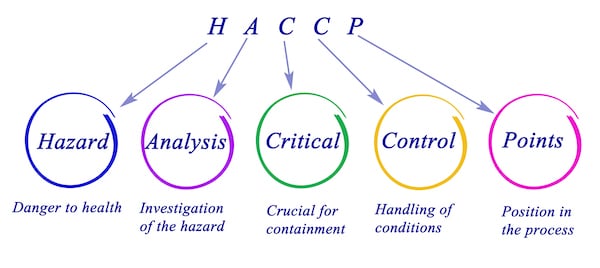
Is a HACCP Plan Mandatory?
Although not mandatory for most industries, HACCP is required for manufacturers and processors of meat, fish, poultry, and juice products. Although not required, any food business can benefit from the food safety guidelines for a plan by the FDA or the USDA. A HACCP plan can help all food establishments, processors, etc. Of course, they must still comply with local authority health and safety requirements.
Certifiers
There are two central certification bodies in the USA that undertake inspection and audit processes. The first one is the Food Safety and Inspection Service (FSIS). This body runs a voluntary HACCP program. Their system lets plants be HACCP certified by their in-house inspectors of meat.
Regarding certification cost, there is typically no extra charge for this inspection service due to its being done by in-house personnel. However, establishment owners still need to settle regulatory fees with FSIS.
The US Department of Agriculture (USDA) is the second certification regulatory body. They typically bring in an external inspector to do a compliance audit. This entity charges around $2000 a day for a HACCP audit, although they do not charge a HACCP certification cost.

Food Safety
Food safety is essential to any company selling consumables to the public. A company needs to comply with FDA federal regulations and develop a food safety plan or a food safety management system. This includes in-house practices and complying with external industry regulatory standards.
Food Safety Plans
Food safety plans are essential for industry best practices and consumer protection. While a HACCP plan may require some effort to develop and extra everyday costs, having a stringent plan in place is worth it to avoid the hassles and expenses of non-compliance. There are guidelines available that can help you write your own HACCP plan.
If auditors are unhappy with food safety levels when they come to inspect, you can be shut down for weeks. This means a loss of income while still needing to cover staff salaries, rent, utilities, and other related cost factors. You may even need to shut down permanently.
In short, investing in good HACCP practices and certification can make the difference between losing your business or developing a thriving enterprise.
HACCP Audit Processes
Audit processes can be time-consuming, costing a pretty penny if the in-house staff doesn’t have the training. However, auditors usually apply systems to assess an establishment’s food safety HACCP plan.
An auditor typically won’t spend hours checking individual foods and products but will focus on an establishment’s food safety management plans and processes. Auditors develop a scheme allowing one inspection at the end of every day.
This will give the auditor a sense of what is happening in the business and show the inspector if bacteria and other illness-causing substance levels are in check.
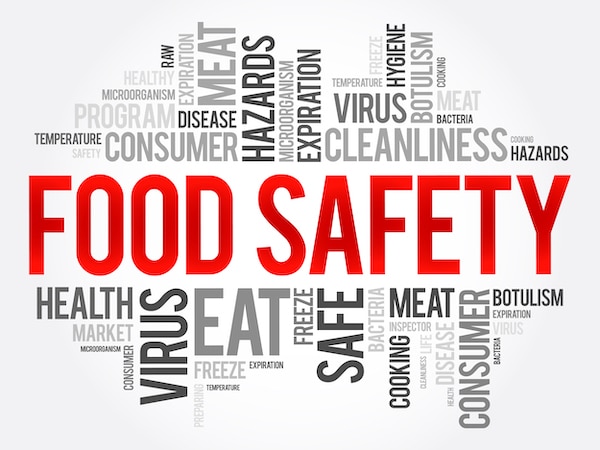
Tips for a Smooth External Audit
External audits can be stressful and expensive, but there are ways to minimize pressures and costs. Its External audits can be stressful and expensive, but there are ways to minimize pressures and costs. It’s all about positive HACCP plan development practices within your company so you can get your certificate.
To avoid the high cost of HACCP non-compliance and shut-downs, you can do the following to prepare:
Support your staff
Make sure your staff is comfortable with all food safety processes. Make sure HACCP plan communication lines are clear and that you have regular food safety training sessions. A confident team is half the battle won.
Build a Strong Food Safety Management System
Systems with consistent checks and accountability are more likely to pass an inspection than inconsistent ones where no one is sure who is supposed to be doing what. A checking system should apply to all aspects of food production, from growing to harvesting, delivery, cleaning, serving, etc.
Keep Records Up-to-Date
When auditing, inspectors will check if your facility records and documentation are clear and up to date. Auditors want to see via your documentation that this process is seamless and organized. When your auditor is booked, make sure you can quickly and easily supply the following:
- Maintenance record documents
- Cleaning checklists
- HACCP training certificate documents
- Documents from previous audits, including your last HACCP certificate
Your checklists also need to be provided in digital form nowadays.
Be Open to Learning
Having a poor attitude when auditors find possible food safety issues can escalate matters in a negative direction. Make sure you and your staff are open to receiving constructive criticism and are prepared to make any necessary adjustments.
A positive attitude to corrective action and new HACCP certification training will show your auditor you are serious about protecting your customers from food hazards. This will, in turn, show the inspector that your enterprise is less at risk of non-compliance in the future.
Aggressive reactions to constructive criticism in the certification process may lead an inspector to decide to shut your food company down until you can change how you approach food safety. This can lead to unnecessary stress and expense.
These guidelines are also applicable to internal audit processing.
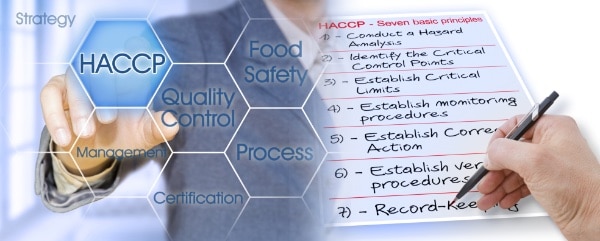
Do an Internal Audit and Save
The majority of companies choose to get their audits completed by a personnel member with appropriate training in the business. This is a great option for both a small and large facility.
It poses a lower HACCP certification cost, creates less pressure, and allows food establishments to receive information in-house on how to improve their HACCP systems.
Allocate a Staff Member to do HACCP Audit
By training an in-house inspector, you can avoid the extra HACCP certification cost of engaging a third-party auditor. If you do not have someone already, you can select a member of staff to do the HACCP training and establish them as a Certified Food Safety Representative. This can save you a lot of money.
You will not have to pay extra annual audit fees to an external auditor. You will just need to cover the HACCP training cost and cover any cost for the staff member to do their tests and checks during an audit so you can get your certificate.
This last can bring the HACCP certification cost down by about 30%, which gives you a significant saving.
How to Get HACCP Certified as an Auditor
To do in-house audits, a staff member will need to do training and study a HACCP course. The staff member will also need to prepare to take the Certified HACCP Auditor (CHA) Exams. This training is obtainable from the American Society of Quality (ASQ). You can choose your exam date from the range offered.
A HACCP training provider like International HACCP Alliance can help a staff member get a HACCP training certificate to carry out our food safety duties and annual inspections. After they complete training by taking HACCP courses, the staff member will be aware of:
- HACCP standards for good manufacturing practices for food products.
- HACCP critical limits.
- HACCP principles.
They will also know how to process documentation for HACCP.
About Certification Prerequisites
HACCP certification requires certain objectives to be met. Food businesses must have good HACCP plans or food safety plans, including staff training, in place. A good HACCP system means a food business must have:
- Good manufacturing and sanitation control practices.
- Be able to take corrective actions when issues are identified.
- Have a critical control point in place so human food products can be quality-checked continuously.
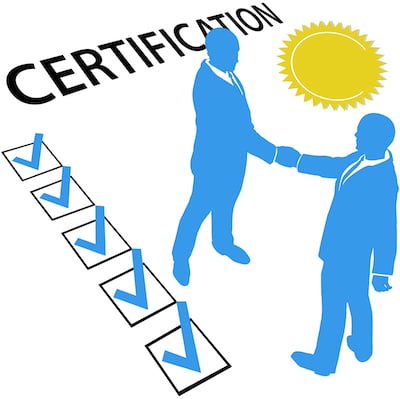
The HACCP Certification Process
Having your annual certification done is about checking for likely hazards and correcting them as soon as possible. It typically happens mainly in two stages, with other steps in between. In a nutshell, you can expect the following process:
- First, you’ll need to apply for the certification, providing the necessary documentation for an off-site review prior to stage one. Once this is complete, an auditor will check your HACCP training and education. They will ask you questions about HACCP plans.
- An auditor will check your enterprise and perform an on-site review to determine safety levels and give feedback on what is found. An inspector will check your HACCP plan and HACCP system and also perform a hazard analysis and a gap analysis.
- The latter shows how serious a problem may be and how wide the gap is from where the issue is to where it should be. The larger the gap, the larger the issue is, and the more time and money it may take to rectify.
- The auditor may also need to come back and check that any necessary corrective action for issues found has been applied. The process and documents will also be logged with a certification body.
While the benefits of an HACCP plan are many, you must remember that it is definitely a “process” that must be followed.
How Long Does it Take to Complete an Audit?
It often takes about six weeks to complete an audit and get HACCP certified from start to finish. This includes inspecting food growing, harvesting, and production systems and submitting all documentation to the FDA. It may take a bit longer for the certification to be cleared by FSIS or USDA.
The process can be quicker if you have good manufacturing practices in place.
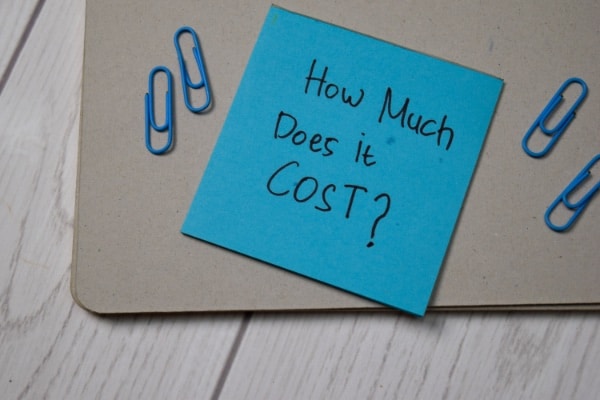
How Much Does a HACCP Plan Cost?
Depending on whether you get an internal or external auditor, the full process is around $5,000 to $6,000. HACCP certification expenses also depend on the type of enterprise you have, how large it is, and the provider you choose, assuming you hire a company to complete the plan.
What Affects Cost?
The HACCP certification cost may increase over time with inflation, how auditors undertake an inspection, HACCP training cost (such as doing HACCP courses through the International HACCP Alliance), and many factors. Remember that HACCP certification cost factors may also be related to changes you need to make in your establishment to reach acceptable requirements.
Corrective action for any potential health problems identified in an audit may also cost money. The expense will depend on what is found to be problematic and how intensive a process needs to be undergone to rectify it.
Some staff training may be necessary to fix a problem, or you may need to invest in new machinery or FDA-approved technical equipment.
Some Closing Thoughts
As you can see, HACCP certification processes and expenses can be intensive, but there are many benefits to getting it done. It’s best to be proactive and ensure you have excellent food safety plans in place rather than reactive, where you may have to take significant and expensive corrective action.
Ensuring a trained staff member can carry out certification audits in-house will save a lot of time, money, and stress. There are many HACCP courses out there to help you complete your certification. Cost is significant, so hopefully, now you understand how much a HACCP plan will cost.